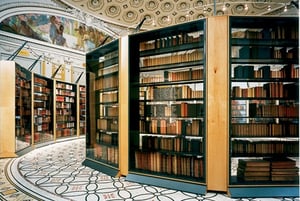As lovers of rare books and ephemera, it can be difficult to hear someone ask the question, “is book collecting worth it?” Establishing a collection can bring a lifetime of joy, from seeking out new objects at home and abroad to cataloguing those items with care. And if you’re lucky, your collection might just have great significance to others, too. A study conducted by researchers at King’s College London determined that upwards of 30 percent of adults participate in some form of collecting, from books and ephemera to travel souvenirs and memorabilia. Psychologists have long attempted to classify and define the impulse for collecting, or what Nicholas Basbanes describes as “a gentle madness” among book collectors. While we can’t provide you with a definitive scientific answer as to why book collecting is worth it, we can tell you about how the time, energy, and money you’ll spend in developing your collection can become a life-long project and passion.
Pushing Back Against the Digitization of the Twenty-First Century

Are you tired of electronic communication, various digital e-readers, and music that seems to be available only through streaming platforms? Do you long for the days of analog technology filled with stacks of physical books and vinyl records? Creating a book collection can give you the pleasure, in some small way, of preserving a past that feels nearly lost. In finding that pleasure, you can begin the process of pushing back against the digitization of the twenty-first century and reminding yourself of the significance of physical objects in the material world.
But when it comes to book collecting, there are so many more reasons to pursue this endeavor beyond nostalgia and longing. Curating a book collection is so much more than a hobby. For many, it becomes a singular creation.
Excitement! Thrills! Fun! Purpose!
One of the best reasons to start a book collection, and to continue building that collection over the years, is that collecting can be a truly exciting undertaking. When you travel to a new city, state, or country, you can seek out bookstores where you might find unexpected objects for your collection. Some cities, of course, are better than others, but it’s rare to visit a place that doesn’t have at least one bookshop or book market. Indeed, we’ve visited bookstores throughout the United States, including in smaller towns where you might not expect to find a fabulous shop selling rare and antiquarian books. We’ve also stopped into bookstores and book markets across the globe—some in cities you might expect like London, Paris, Tokyo, Buenos Aires, and Mexico City, and some in regions where we were thrilled to discover thriving rare bookshops like Mumbai, Wellington, Johannesburg, and Jerusalem.
Book collecting can also be a fun way to spend time from the comfort of your own sofa or desk. Given that so many bookstores have online shops and participate in online marketplaces, you can “waste” time browsing online for potential additions to your collection. Many auction houses even have online platforms, allowing you to bid remotely on a book or piece of ephemera that would be perfect for your collection.
Beyond the thrill of finding news objects to add to your collection, creating and maintaining a book collection can also fill you with a sense of purpose. While some people regularly shop for mass-produced consumer items that are likely to end up in a landfill, building a book collection can allow you to find meaning despite other difficulties or disappointments that are bound to occur over the course of a lifetime. In his book A Life in Thirty-Five Boxes, Dave Haslam sums it up: “A collection is a life’s work, you’ll want to know what will go where, who gets what. One aspect of collecting—certainly cataloguing—is to exert control over the general chaos of life. A collector will hope to be in control even at, and beyond, the end . . . .” While Haslam’s writing refers specifically to his record collection, his words can resonate with book collectors everywhere.
A Lifetime of Learning: Discovering as You Build Your Collection

Building a book collection can allow you to discover new ideas, texts, presses, writers, cataloguers, typographers, graphic designers, bookstores, and even regions of the globe that you never knew about. Creating a book collection, to be sure, is a way of ensuring your continuing education even after you’ve long since left any academic setting.
As your collection develops and you learn more, you’ll imagine new ways to expand the collection. For example, you might begin a collection with first editions of Louis Erdrich works, but as you learn more about Indigenous literatures, that collection might expand to include works by other Indigenous authors in the U.S. such as Leslie Marmon Silko or Ray Young Bear, and to Indigenous writers in other parts of the world like Alexis Wright or Witi Ihimaera. You may find your collection expanding in other ways, too. For example, if you begin collecting the works of Jorge Luis Borges, you could discover a variety of interesting independent presses that worked on translations and publications of his pieces across the twentieth century, leading to a new arm of your collection.
Collecting as an Investment
While your book collection need not have market value to have worth to you and to others (such as researchers), a book collection often can be a monetary investment. If you put together a collection that has substantial market value, you could discover that your book collection is ultimately the most prized investment you own. And even if the collection does not have significant market value, it can nonetheless be an essential intellectual investment. Indeed, you could be assembling a collection with substantial scholarly importance for researchers in the years and decades to come.
By curating a collection—choosing what goes into the collection and explaining why—and cataloguing it meticulously, you can create an important and valuable record for the future.









